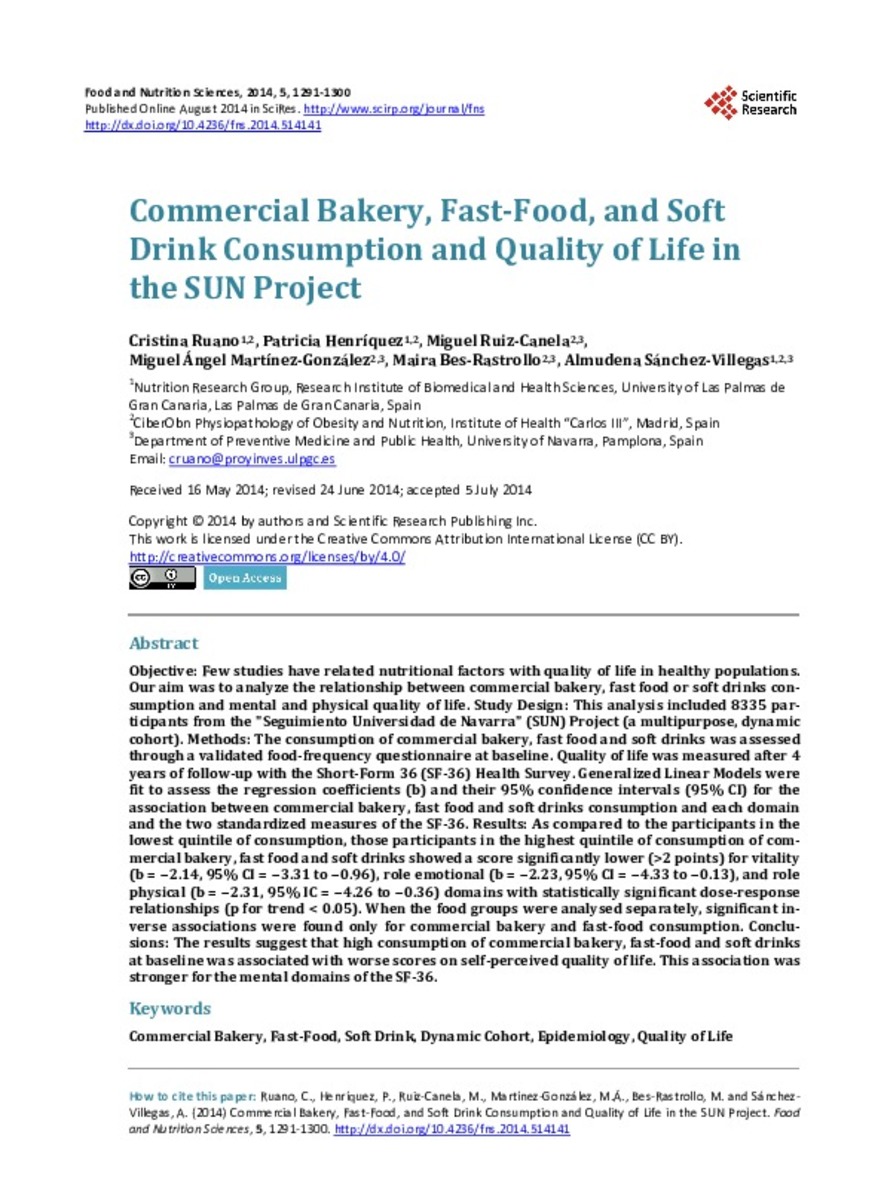Full metadata record
| DC Field | Value | Language |
|---|---|---|
| dc.creator | Ruano, C. (Cristina) | - |
| dc.creator | Henriquez-Sanchez, P. (Patricia) | - |
| dc.creator | Ruiz-Canela, M. (Miguel) | - |
| dc.creator | Martinez-Gonzalez, M.A. (Miguel Ángel) | - |
| dc.creator | Bes-Rastrollo, M. (Maira) | - |
| dc.creator | Sanchez-Villegas, A. (Almudena) | - |
| dc.date.accessioned | 2017-03-10T13:15:28Z | - |
| dc.date.available | 2017-03-10T13:15:28Z | - |
| dc.date.issued | 2014 | - |
| dc.identifier.citation | Ruano, C., Henríquez, P., Ruiz-Canela, M., Martínez-González, M.Á., Bes-Rastrollo, M. and Sánchez-Villegas, A. Commercial Bakery, Fast-Food, and Soft Drink Consumption and Quality of Life in the SUN Project. Food Nutr Sci 2014;5:1291-1300. | es_ES |
| dc.identifier.issn | 2157-944X | - |
| dc.identifier.uri | https://hdl.handle.net/10171/43078 | - |
| dc.description.abstract | Objective: Few studies have related nutritional factors with quality of life in healthy populations. Our aim was to analyze the relationship between commercial bakery, fast food or soft drinks consumption and mental and physical quality of life. Study Design: This analysis included 8335 participants from the "Seguimiento Universidad de Navarra" (SUN) Project (a multipurpose, dynamic cohort). Methods: The consumption of commercial bakery, fast food and soft drinks was assessed through a validated food-frequency questionnaire at baseline. Quality of life was measured after 4 years of follow-up with the Short-Form 36 (SF-36) Health Survey. Generalized Linear Models were fit to assess the regression coefficients (b) and their 95% confidence intervals (95% CI) for the association between commercial bakery, fast food and soft drinks consumption and each domain and the two standardized measures of the SF-36. Results: As compared to the participants in the lowest quintile of consumption, those participants in the highest quintile of consumption of commercial bakery, fast food and soft drinks showed a score significantly lower (>2 points) for vitality (b = −2.14, 95% CI = −3.31 to −0.96), role emotional (b = −2.23, 95% CI = −4.33 to −0.13), and role physical (b = −2.31, 95% IC = −4.26 to −0.36) domains with statistically significant dose-response relationships (p for trend < 0.05). When the food groups were analysed separately, significant inverse associations were found only for commercial bakery and fast-food consumption. Conclusions: The results suggest that high consumption of commercial bakery, fast-food and soft drinks at baseline was associated with worse scores on self-perceived quality of life. This association was stronger for the mental domains of the SF-36. | es_ES |
| dc.language.iso | eng | es_ES |
| dc.publisher | Scientific Research | es_ES |
| dc.rights | info:eu-repo/semantics/openAccess | es_ES |
| dc.subject | Materias Investigacion::Ciencias de la Salud::Salud pública | es_ES |
| dc.subject | Commercial bakery | es_ES |
| dc.subject | Fast-food | es_ES |
| dc.subject | Soft drink | es_ES |
| dc.subject | Dinamic cohort | es_ES |
| dc.subject | Epidemiology | es_ES |
| dc.subject | Quality of life | es_ES |
| dc.title | Commercial Bakery, Fast-Food, and Soft Drink Consumption and Quality of Life in the SUN Project | es_ES |
| dc.type | info:eu-repo/semantics/article | es_ES |
| dc.description.note | This work is licensed under the Creative Commons Attribution International License (CC BY). http://creativecommons.org/licenses/by/4.0 | es_ES |
| dc.editorial.note | Copyright © 2014 by authors and Scientific Research Publishing Inc. | es_ES |
| dc.identifier.doi | http://dx.doi.org/10.4236/fns.2014.514141 | es_ES |
Files in This Item:
Statistics and impact
Items in Dadun are protected by copyright, with all rights reserved, unless otherwise indicated.






